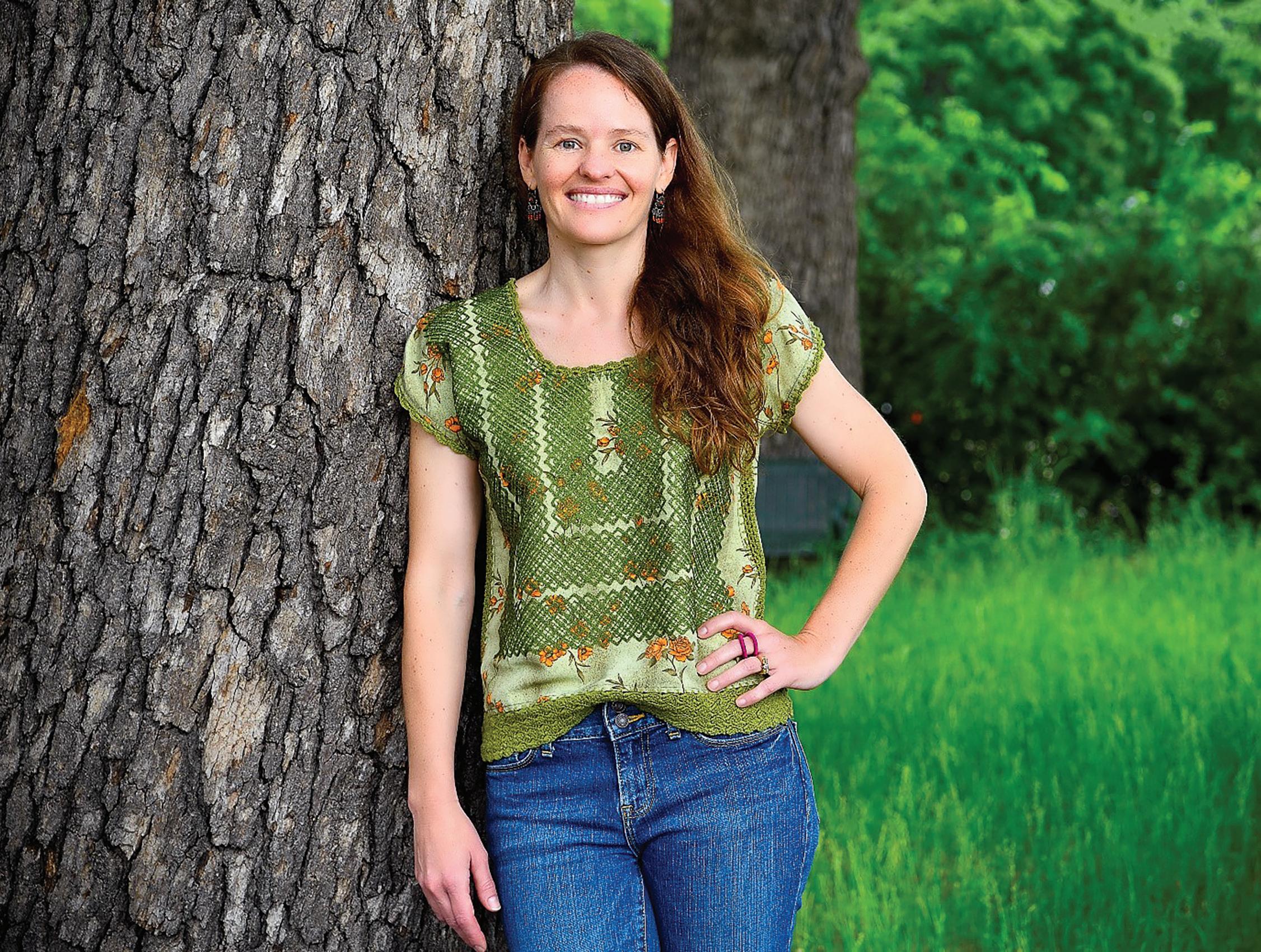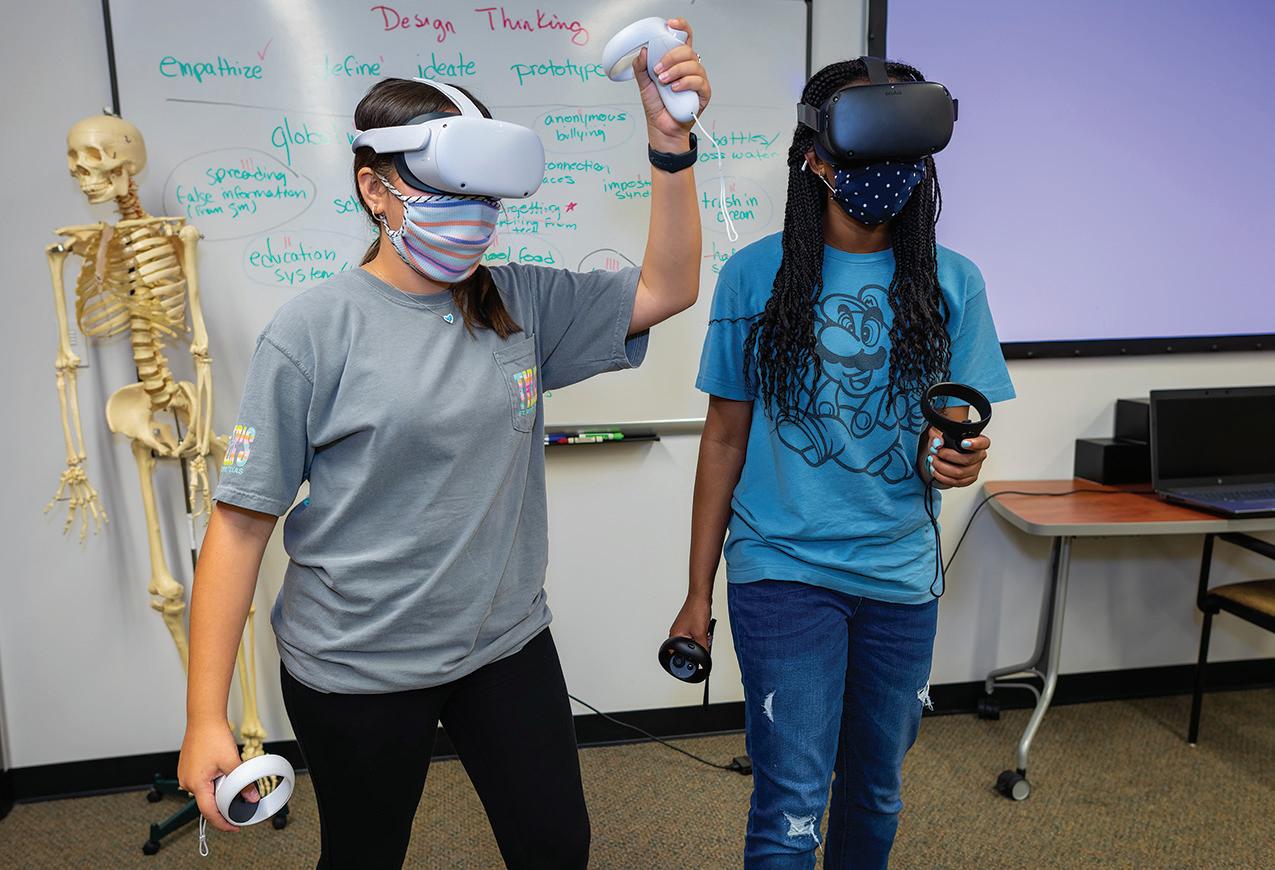
5 minute read
INNOVATION
Above
Alexandra PonetteGonzález is one of seven scientists selected to serve on the Environmental Protection Agency’s Clean Air Scientific Advisory Committee.
Listen to Ponette-González discuss her cutting-edge research in Episode 30 of UNT Pod. anchor.fm/unt-pod
Breath of Fresh Air
UNT ecosystem geographer selected to serve on nation’s top advisory committee informing air quality standards.
Alexandra Ponette-González, associate professor in the Department of Geography and the Envi-
ronment, was recently selected to serve on the Environmental Protection Agency’s Clean Air Scientific Advisory Committee, the nation’s top advisory committee informing air quality standards. PonetteGonzález’s research explores the impact of global environmental change on nutrient and pollutant emissions and deposition to ecosystems. Her ongoing research has shown that oak trees can capture significant quantities of airborne soot, a major climate forcing agent and air pollutant. In June, she co-authored a paper in Frontiers in Ecology and the Environment on the diverse community of tiny organisms and non-living materials in precipitation that could potentially play big roles in ecosystems.
— Jamie Baxter-Sly
An instructional laboratory supervisor and adjunct lecturer in the Department of Biological Sciences, she is excited about the oppportunites that await UNT students now that UNT’s student chapter of the Society for Ecological Restoration has established an official affiliation with the National Audubon Society via the Audubon on Campus Chapter Program.


CONTROLLING SOUND WAVES AT NEW CAMP, IDEAS SURGE
UNT researchers are gaining the
attention of the physics world with their discoveries that could lead to new methods of mechanically reflecting sounds or other vibrations, such as earthquakes. Potential applications of their acoustic shield range from removing traffic noise to enabling interception-free private communication to protecting buildings from earthquakes, tsunamis or ultrasonic attacks.
The technology uses phononic crystals made of aluminum rods embedded in water and symmetrically arranged. Researchers from the Department of Physics are demonstrating that phononic crystals that are partially submerged in fluid can be used for reflecting sound almost completely by rotating them randomly instead of keeping them in an ordered pattern.
UNT’s Girls Surge into Stem XR
Camp — spearheaded by Aleshia Hayes, assistant professor of learning technologie — teaches underrepresented female students in grades 6-12 skills such as user experience (UX) and prototyping. The one-week pilot took place this July, with an expanded three-week version of the camp set for next summer.
During the event, the participants conceptualized their own apps based on the week’s deep dive into design thinking. And the learning flowed both ways — working in small groups with students allowed Hayes to better understand the hurdles teachers may face when integrating simulation technologies into their classrooms, a key part of her research.
Read more about the Girls Surge into STEM XR Camp. northtexan.unt.edu/stem-camp
INNOVATION
Making Roads Safer to Drive
Maurizio Manzo and Zhenhua Huang, researchers in UNT’s Department of
Mechanical Engineering, are using a grant from the Texas Department of Transportation’s Research and Implementation Division to solve a common problem that affects safety on roads — road striping. Changing the yellow or white lines is not a simple task for highway departments, and many of the methods currently used can cause major safety concerns because various striping patterns can appear on the road under different light conditions. The goal of Manzo and Huang’s project is to find an economic way to eliminate existing striping. Their solution uses thermal ablation through lasers that will attach to TxDOT trucks to clean the paint off the roadway quickly and completely. The duo believes their method will have less environmental impact and be faster — depending on the material used — than conventional methods.
Designing Drones

A core group of UNT engineering
researchers are rethinking the way Unmanned Aerial Vehicles operate as part of an initiative to improve battlefield efficiency and soldier safety for the U.S. Army. Kamesh Namuduri, professor in the Department of Electrical Engineering; assistant professor Hector Siller, in the Department of Mechanical Engineering; and Nandika D’Souza, University Regents Professor in the Departments of Materials Science and Engineering and Mechanical Engineering have developed a lightweight drone using specially designed materials and additive manufacturing with a goal of improving the UAV’s ability to fly farther and carry more payload, such as increased sensors, supplies or munitions for military units. The initiative is front and center for the U.S. Army Combat Capabilities Development Command, known as DEVCOM, Army Research Laboratory.
Taming Fungus
Jyoti Shah, chair of UNT’s De-
partment of Biological Sciences, is working to knock out a crop fungus that could improve food availability for future generations. In his research, Shah is looking at Fusarium head blight, a disease that affects wheat and barley. When this disease occurs, it results in losses ranging from $300 million to $1 billion per year in the U.S. alone. To counter this costly affliction, Shah and his team are working to identify genes in the wheat plant that may make it susceptible to the fungus. Reducing activity of these genes makes the wheat plant more resistant to the disease. Shah’s research is funded through the U.S. Wheat and Barley Scab Initiative and the U.S. Department of Agriculture.
By the Numbers

125%
That’s the percentage of UNT’s current capacity in high-performance
computing that UNT researchers will immediately have access to thanks to the university’s collaboration with the University of Texas at Austin’s Texas Advanced Computing Center.
“This new collaboration will have extraordinary long-term impacts for research at UNT,” says Mark McLellan, vice president of UNT’s Division of Research and Innovation. “It creates exciting opportunities for innovative and impactful research outcomes. Working with TACC will allow UNT’s research teams to effectively address a range of pressing global challenges.”
The TACC has developed some of the world’s most powerful computer resources. Under the five-year agreement, UNT faculty and students will have access to TACC’s high-performance computing systems under the same conditions as any faculty member at UT Austin.







